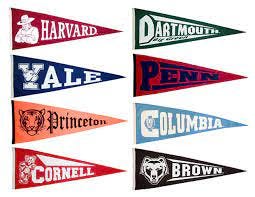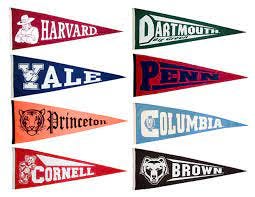Issue #149 Education October 12, 2022
What is the “Ivy League” and Where Did the Name Come From?
The eight universities that make up the “Ivy League” are the oldest universities in the northeastern United States (year established):
Harvard University in Cambridge, Massachusetts (1636)
Yale University in New Haven, Connecticut (1701)
University of Pennsylvania in Philadelphia, Pennsylvania (1740)
Princeton University in Princeton, New Jersey (1746)
Columbia University in New York, New York (1754)
Brown University in Providence, Rhode Island (1764)
Dartmouth College in Hanover, New Hampshire (1769)
Cornell University in Ithaca, New York (1865)
The term “Ivy League” was reportedly first used around 1933 to describe some of the colleges competing in soccer that had ivy vines growing on their buildings. In 1945, the presidents of those eight schools agreed to maintain the original intercollegiate tournament tradition while also remaining true to the each university’s academic mission. It wasn’t until the 1950s that the Ivy League schools increased their focus on academics, and now the schools are known more for their academic elitism than their athletic teams.
Out of the 46 presidents of the United States, 15 received undergraduate degrees from Ivy League Schools, including John F. Kennedy, George H.W. Bush, George W. Bush, and Barack Obama.
The prestige of attending an Ivy League school is unmatched, but there is more to the story of how these colleges and universities were founded and funded throughout the centuries.
The “Ivies” Come to Terms with Their Racist Pasts
Seven of the eight Ivy League schools were founded in the 17th and 18th centuries when slavery was prevalent and legal in the colonies and the new United States. Many of the founders of these schools were either slaveholders themselves or supported slavery for economic reasons.
Most of the “Ivies” discriminated against women, Black people, and other people of color in admissions and promotions at least until the latter part of the 20th century.
“Affirmative action” as a policy was intended to address the centuries of discrimination, persecution, exploitation, and underrepresentation against women and minorities, including in admissions and faculty appointments in colleges and universities. But recently, many white people and some Asian Americans are crying “foul” and accusing the school of “reverse racism” against their demographics.
President Woodrow Wilson was a segregationist who graduated from Princeton University in 1879. The public policy school and residential college were named for Wilson, but Princeton recently announced that those departments would be renamed because of the “racist thinking and policies” of the former president.
Yale University is named for Elihu Yale, who was a slave owner and slave trader. The university has stated that it will not rename the school.
Many members of the faculty and alumni of the University of Pennsylvania helped to write parts of the United States Constitution that supported slavery.
In 2018, Amy Gutmann, then president of the University of Pennsylvania, revealed that 75 former trustees of the school, including William Smith, the first provost, were slave owners.
George Whitefield, a Penn trustee, advocated for Georgia to allow slavery in the 1740s for the benefit of his orphanage business and for boosting the economy of the colony.
A “reverse racism” accusation against Harvard University is on the docket of the Supreme Court for the 2022-2023 term, alleging that Harvard and other schools use “affirmative action” to admit Black students over equally-qualified Asian and white students.
The family that founded Brown University and about 30 other founding members either owned slaves outright or actually captained slave ships.
Even though most of the residential colleges at Yale were named from the 1930s through the 1960s, they carry the names of slave traders or defenders of slavery.
Cornell University, founded by Quaker Ezra Cornell, is the only Ivy League school with no connection to slavery. It was founded in 1865, the same year that slavery was abolished in the United States.
What is your knowledge about or experience with the “Ivies?” Let us know in the comments!
Do you enjoy “We Are Speaking?” Help us to grow to 500 free subscribers and 250 paid subscribers by December 31!
“We Are Speaking” is a reader-supported publication. To receive new posts and podcast episodes and to support our work, consider becoming a free or paid subscriber. We publish 7 days/week and 28+ issues/month. You. can upgrade your free subscription to the paid level. It costs monthly and annual paid subscribers less than 35¢ an issue. Thank you!





